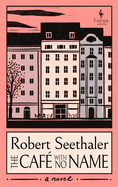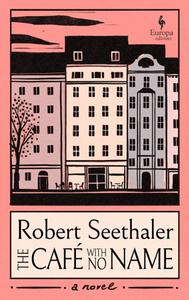
 The Café with No Name by Austrian writer Robert Seethaler (The Field; The Tobacconist) opens in 1966 Vienna. Robert Simon is 31 years old and about to embark upon the quiet dream of his lifetime. It's his final day at the market where he's worked for seven years, as he begins to clean out and shape up a long-empty café across the street. Simon is a solitary, steady, and kind man who was orphaned as a young child during the war and is now a reliable worker who keeps to himself. "For a while he worked as a glass clearer and brush boy in the Prater beer gardens, and perhaps it was there--as he roamed between the tables in search of empty glasses, chicken bones and cigarette stubs in the light of the coloured lanterns--that he first felt a nascent germ of yearning: to do something that would give his life a decisive affirmation. To one day stand behind the bar of his own establishment." He realizes this modest ambition with the café on the edge of the bustling market, where Simon serves blue-collar workers like himself. He offers beer, wine, coffee, and raspberry soda; bread with drippings and gherkins; and a place of respite. He is soon joined by a single employee, a loner like himself. Mila, too, finds a home in the café with no name.
The Café with No Name by Austrian writer Robert Seethaler (The Field; The Tobacconist) opens in 1966 Vienna. Robert Simon is 31 years old and about to embark upon the quiet dream of his lifetime. It's his final day at the market where he's worked for seven years, as he begins to clean out and shape up a long-empty café across the street. Simon is a solitary, steady, and kind man who was orphaned as a young child during the war and is now a reliable worker who keeps to himself. "For a while he worked as a glass clearer and brush boy in the Prater beer gardens, and perhaps it was there--as he roamed between the tables in search of empty glasses, chicken bones and cigarette stubs in the light of the coloured lanterns--that he first felt a nascent germ of yearning: to do something that would give his life a decisive affirmation. To one day stand behind the bar of his own establishment." He realizes this modest ambition with the café on the edge of the bustling market, where Simon serves blue-collar workers like himself. He offers beer, wine, coffee, and raspberry soda; bread with drippings and gherkins; and a place of respite. He is soon joined by a single employee, a loner like himself. Mila, too, finds a home in the café with no name.
Seethaler's tender novel follows Simon and his café for the 10 years that they operate, until a change in the building's ownership pushes the small business out again. These years see Simon's Vienna neighborhood rebuild from postwar austerity, its population and workforce swell and change, and cultural patterns begin to shift. The café is a microcosm of these evolutions.
The Café with No Name does not have a plot filled with action, conflict, and resolution; instead, it focuses on mundane details of life. "Simon couldn't help smiling at the thought of all the lost souls who came together in his café every day." An aging prizefighter, two older ladies who drink and chat in the afternoons, the cheese shop proprietor and her painter boyfriend, and Simon's friend the butcher are among the regulars; they and others experience death and dismemberment, quiet violences, loss, and alcoholism, but also uplifting moments of humanity, friendship, and love. There are, remarkably, no villains in this novel, only people struggling against ordinary human challenges. While Seethaler's characters face significant difficulties, the story never feels grim, but rather steadfast and even hopeful. Katy Derbyshire translates Seethaler's prose from the German with calm delivery, charming descriptions, and understated humor. This lovely novel sweetly and simply emphasizes built family, resilience, and rebirth. --Julia Kastner, blogger at pagesofjulia
Shelf Talker: A humble café in post-World War II Vienna serves as backdrop for all the large and small dramas of everyday life in this subtly scintillating novel.

